11 Search Engines to Break Free From the Google Monopoly
Author & Editor
Content Specialist
Published on: Sep 8, 2023 Updated on: Oct 3, 2025
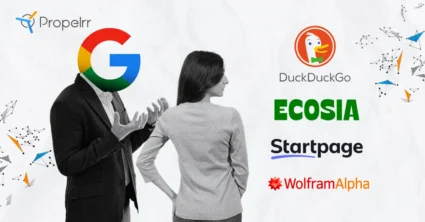
Search engines have become an essential piece of our modern-day lives.
Need to know who won the 2014 World Cup? Done. Looking for a solution to a complex problem? Piece of cake. 93% of our online journeys begin with a search engine—it's almost like they've penetrated our day-to-day habits. 87% of users start their product research online. After all, why not do some research before spending your hard-earned cash?
But guess what? They don't just help individuals out; businesses love them too. 71% of marketers believe SEO has been a major factor in their digital marketing success. Search engines are here to stay, providing us with knowledge, convenience, and access to goods and services.
Google is, of course, the ultimate guru when it comes to searching the web, but don't forget that there are many other search engines out there with special features and perks that you may be missing out on.
With increasing worries about data privacy, many people are looking for alternative search options that safeguard their personal information. Enter DuckDuckGo and StartPage, two search engines that put privacy first as they save no trace of your search history or data.
While search engines are unquestionably important, it's worth noting that not all search engines are created equal. Today’s web boasts a plethora of choices, each one modeling its own specific set of features and benefits.
Whether you’re in the market for a private search engine or something more niche, our detailed guide will help you narrow down your options so you can identify the best alternative search engine for you. All it takes is a few minutes to satisfy your curiosity and ensure top-notch results.
Alternative search engines
If you're bored with your current search engine, why not try something different? These alternative search engines offer a range of fun features and benefits for you to explore, from privacy and security to specialized search options. Spice up your web search and find the one that best fits your needs:
DuckDuckGo
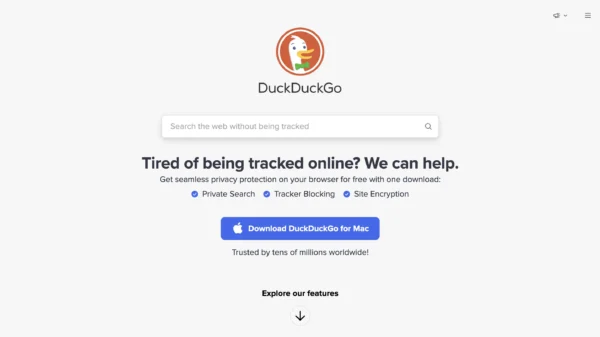
DuckDuckGo is for you if you’re looking for a private search engine. Ever since Gabriel Weinberg started this service in 2008, it's grown to be a popular choice among users who want to protect their data from getting devoured.
Your searches are anonymously stored, meaning those silly tracking cookies and IP addresses don't have a chance—they'll just get shooed away. With instant answers and a clean interface, DuckDuckGo makes it easy to find the information you need without wading through pages of irrelevant results. Its neutral search results mean that you can trust that the information you're getting is unbiased and not influenced by past online behavior.
Switching to DuckDuckGo isn't just practical, it's a statement. It's your way of saying no to the tech giants, who would love nothing more than to snoop on all your online activity.
What sets them apart from Google?
It's downright maddening, perplexing, and mind-numbingly time-consuming – that's the perceived reality of searching on Google sometimes.
DuckDuckGo's “Bangs” feature can save you from this mental purgatory. With Bangs, you can quickly and effectively search specific websites and services just by typing an exclamation point followed by its shortcode.
Let's say you wanted to look for a video on YouTube, all you'd need to do is type "!youtube" plus your query, and boom! You'll be taken straight to the relevant page on their site.
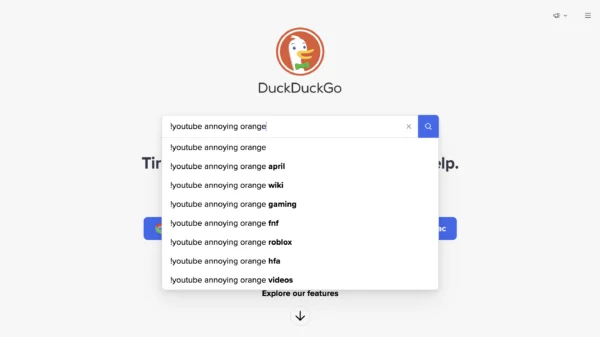
Not only are Bangs an incredible timesaver, but they're also highly customizable with hundreds of pre-made codes for ubiquitous sites like YouTube, Wikipedia, and Reddit.
And if the website you want to find isn't on the list? No worries, just craft a custom bang to explore any location on the web that suits your fancy.
How can you leverage this for your brand?
- Optimize your brand for DuckDuckGo. Unlike other search algorithms, DuckDuckGo rewards websites that have a secure connection (HTTPS) and privacy policies. That way, you can climb the ranks on DuckDuckGo and make sure your website is seen first when you integrate search engine optimization.
- Use the advertising tool. You can take advantage of the advertising platform to reach your target audience. It works by displaying contextual ads depending on the user's query, so no worries about personal information leaking out here. Plus, since its users are more privacy-focused, businesses could use this as a bonus to gain customers.
WolframAlpha
Introducing WolframAlpha, a computational knowledge engine created by the brainiac physicist and computer scientist Stephen Wolfram. Since 2009, it has been transforming the way we gather information on the world wide web.
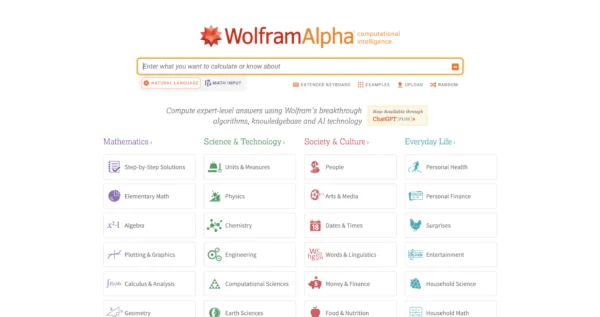
Unlike primordial search engines that just give you a jumble of URLs based on keyword searches, WolframAlpha produces precise answers to your questions through a massive setup of structured data and algorithms.
Imagine having access to an uncanny tool that can answer any question with exactness and clarity, and even add a colorful graphical representation of the answer. It can solve tricky math equations, translate units of measure from one format to another, serve up historical data, and calculate the nutritional value of food. From basic calculations to high-level scientific topics, WolframAlpha has got your back.
What sets them apart from Google?
The showstopper of WolframAlpha is its capacity to furnish intensely detailed solutions to intricate inquiries by tapping into a giant database of structured data and algorithms. Unlike Google, which mostly depends on keywords and hyperlinks to web pages, WolframAlpha employs a computational wisdom engine to generate answers in an approach that mimics the way humans think.
This method has multiple benefits compared to Google. Above all, WolframAlpha can give responses to intricate queries that are difficult or impossible to answer using a conventional search engine. For instance, if you want to learn the gap between two stars in a given constellation, WolframAlpha can provide an accurate response based on its copious astronomy expertise.
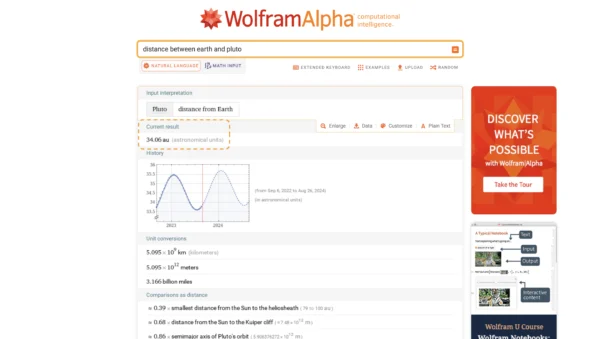
Furthermore, its answers are often more detailed and accurate than those provided by Google.
No more outdated population counts or fuzzy estimates. And if you're feeling too discombobulated to use traditional query terms, WolframAlpha's ability to decipher natural language input allows users to ask questions in the same manner they would initiate a conversation, making it much easier to locate what you need.
This is especially useful when tackling complex queries that may require specific syntax or multiple inquiry terms to get accurate results.
How can you leverage this for your brand?
- Get some insights. By looking into sales trends, demographics, and macroeconomics, they can discover who they should target and how they should modify their strategies. WolframAlpha offers valuable information on population size, spending behaviors, and other patterns in specific regions. This can give businesses an advantage when it comes to marketing and product development plans.
- Gather data. Data analysis and visualizations blossoming with possibilities, companies can gain a better grasp of their performance. Think graphs, charts, insights, and more. For example, using WolframAlpha's help to concoct graphs of revenue, expenses, or even sales over time will provide businesses with patterns to identify which could inform actionable decisions in investments or product development.
- Consider financial planning. This engine also generates forecasts based on historical figures that can direct businesses toward responsible investing and planning (of the fiscal kind). Companies could plot out different scenarios such as pricing changes or market demands to generate models for estimating revenue and expenditure. This allows them to identify both opportunities and risks so that they've got strategies ready to go for mitigating potential issues or capitalizing on golden moments.
Startpage
Startpage is a search engine with an extra-special mission: to protect your privacy. It's simple to use, offering just enough key features to ensure your security and anonymity.
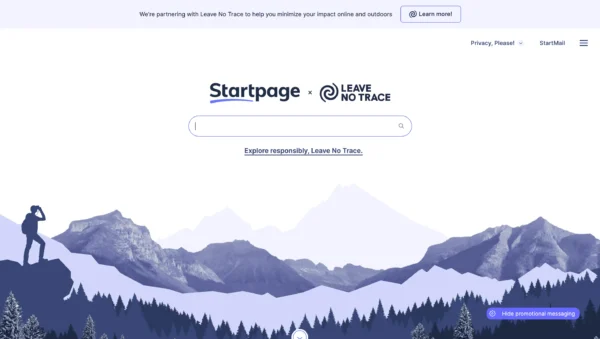
Plus, they really mean business when it comes to protecting your data: they've got European Union privacy laws and General Data Protection Regulation (GDPR) regulations down pat, widely regarded as the strongest privacy protections in the world. Any information related to you or your activities? Startpage considers that as personal data, and you can trust them to look after it like their own.
What sets them apart from Google?
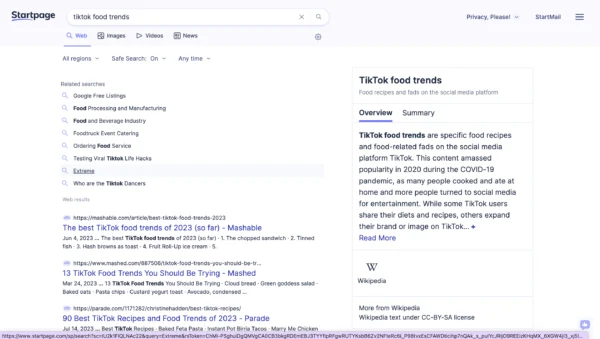
Startpage is no ordinary tool. For starters, it prioritizes user privacy and security above everything else. Its "no-logs policy ensures that none of your personal information or queries are stored for the world to see.
Google, on the other hand, collects every bit of data it can get its hands on. Not only that, Startpage offers a proxy service that allows you to browse the web anonymously. No more worrying about third-party prying eyes watching your every move.
Another area where these two differ is how they serve their search results. While Google likes to spoon-feed you what you want to hear based on your past online behavior, Startpage keeps things real by showing you unbiased and unfiltered search results.
How can you leverage this for your brand?
- Get rid of cognitive bias. With it, you can conduct research with unprecedented finesse, monitor your presence online with pinpoint accuracy, and protect yourself from prying eyes. Conducting research requires accessing data without bias or filter. Startpage gives you access to divergent opinions on any given topic; ideal for conducting market studies or analyzing competitors.
- Protect your brand. Proxy service keeps you safe by masking your IP address and location from hackers, rivals, or anyone else lurking in the cyber shadows. And with its ability to monitor your online presence, you can keep tabs on how your business is being portrayed, so you can preemptively respond to any threats and make sure your reputation stays intact.
- Feel secure. Its dedication to privacy and security means no tracking of data or disruptions caused by cyber-attacks. Keeping sensitive customer information such as financials and medical histories under lock and key will be a cinch.
Ecosia
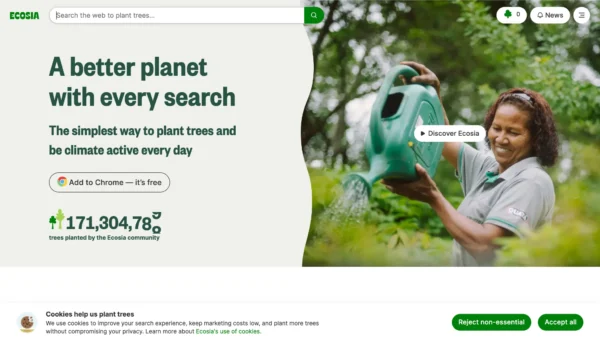
Since its launch in 2009, Ecosia has been growing popular and leaves are turning with it. Based in Berlin, Germany, this search engine makes money by displaying advertisements alongside its results.
But what makes Ecosia so special is its commitment to sustainability and the environment. With over 135 million trees planted in 25 countries by March 2023, their projects are designed to give back to both local communities and global ecology.
Moreover, Ecosia doesn't shy away from accountability when it comes to finances or environmental impact. The company even earned prestigious certifications such as B Corporation, proving its dedication to making a difference in more ways than one.
What sets them apart from Google?
After years of being overshadowed by Google, Ecosia is finally making waves. Unlike its competitor, Ecosia doesn't just provide you with searching capabilities but also has a social responsibility mission to combat deforestation and climate change.
The company uses its profits to fund reforestation projects across the globe, earning itself a fanbase among environmentally-conscious users. Moreover, it is transparent, providing monthly reports detailing its financial and environmental impact. Google, on the other hand, doesn't have any explicit environmental commitments (beyond reducing its carbon footprint) and has recently been under fire for its data privacy policies and role in spreading disinformation and hate speech.
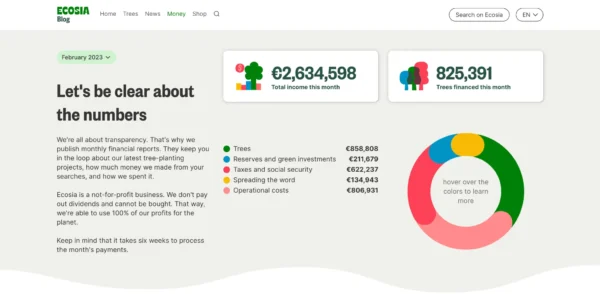
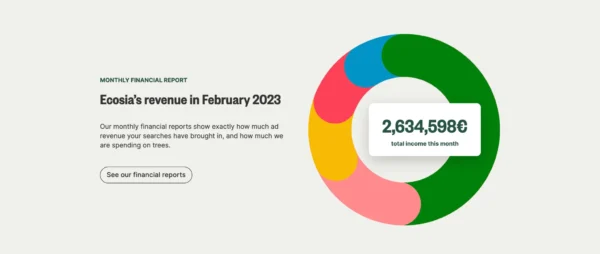
How can you leverage this search engine for your brand?
- Encourage social responsibility. Ecosia is also a valuable tool for businesses looking to reach a group of eco-conscious consumers. Think outside the box and advertise on Ecosia to tap into a niche audience who care about sustainability. Put your green efforts front and center and you could score big with potential customers who share your values. Partner up with Ecosia too, and shout out about your joint commitment to tree-planting projects or launch an exciting marketing campaign together.
- Stay updated. Ecosia can also be a research tool so you're always up-to-date when it comes to sustainability trends and news.
GoodGopher
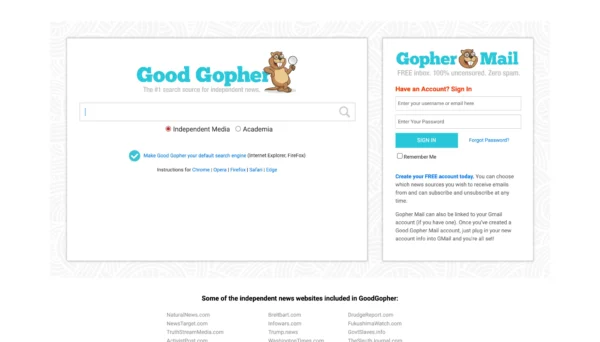
GoodGopher made waves in the search engine arena in 2014 when it was created by Mike Adams, a health freedom trailblazer and founder of Natural News. He designed GoodGopher to be an alternative search engine that focused on academic and scholarly sources, providing a haven for scholars and academics to share their work without fear of censorship or discrimination.
Since its launch, GoodGopher has gone supernova and now includes a wide range of academic and scholarly sources. Whether you're looking for science, technology, social sciences, humanities, or something else entirely–GoodGopher is your one-stop shop. This search engine is used by students, researchers, and academics to find reliable information quickly and easily.
What sets them apart from Google?
GoodGopher and Google are two very unique search engines that have completely distinct styles when it comes to their results. While both can help you find tons of information on the internet, there are a few clear differences between them.
One of the most significant disparities between GoodGopher and Google is the type of sources they prioritize. Google has an expansive range of results sourced from businesses, social media platforms, and other online content, while GoodGopher strictly focuses on academic and scholarly material, like scientific studies and research databases. So, if you're looking for trustworthy facts or need resources for a project, then GoodGopher is your best bet.
What sets these two search engines apart even further is how they handle user privacy. Like what we’ve been mentioning throughout this article, Google collects vast amounts of user data to give personalized search outcomes as well as tailored advertisements; whereas GoodGopher vows not to keep track or store any personal details which means that users don't have to worry about third-party firms snooping in on what they're searching for.
How can you leverage this for your brand?
- Create informative content. As a business owner, you're always hunting for new methods to interact with your customers and strengthen your mark. GoodGopher features independent media sources.
If you’re a digital marketing agency like Propelrr, it's important to stay informed and create content that reflects what's going on in the industry. Publishing informative content can be a great way to flaunt your agency's expertise and build trust with your audience.
It can also help you drive traffic to your website, engage your audience and increase your agency's visibility in the industry
It's the perfect place to boost your presence and get your message out to the masses. GoodGopher's users are always looking for critical information and independent media. So when creating informative content for your social media channels, providing insights and analysis of your industry can be a great resource for your users, thus helping you attract loyal visitors to your website.
Yandex
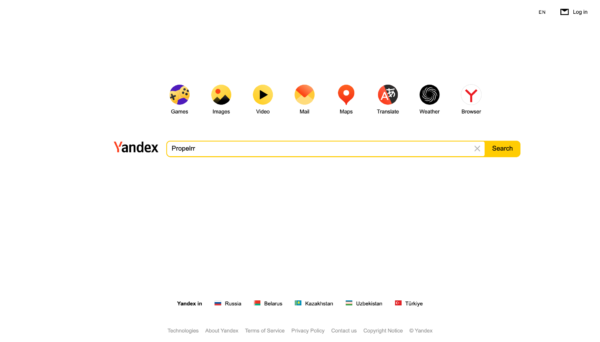
Yandex, the Russian tech giant. It all began in the early days of post-Soviet when privatization was the talk of the town. That's when the daring Arkady Volozh pounced, developing a search engine that could connect people and businesses. Hence, Yandex, a combination of "yet another indexer" and "index" was coined.Throughout its journey, Yandex has consistently championed modernity when it comes to search techniques. Think AI algorithms that understand nuances of the Russian language. Besides searching tech, Yandex has diversified into areas such as mapping services, ecommerce platforms, and even ride-sharing services.
Yandex's story is an incredible one: from simple beginnings, it has become an absolute giant of Russian tech and it looks poised to maintain its ascendancy.
What sets them apart from Google?
One notable discrepancy between Yandex and Google is their approach to separate domains. While Google is a ubiquitous search engine, Yandex primarily concentrates on the Russian market. This particular feature made it possible for Yandex to custom-tailor its algorithms and functions to the specific needs of Russia-based users, thus becoming an irreplaceable tool for all sorts of Russian-language content discoveries.
Another major characteristic distinguishing Yandex from Google is privacy. Yandex is recognized as a more reliable protector of user data than Google, deploying multiple measures to make sure user info is kept safe from any malicious actors. To illustrate, Yandex doesn't store user search records and has reinforced robust security procedures to prevent data breaches caused by cyber criminals or other online miscreants.
In addition to the above-mentioned features, Yandex also offers a whole bunch of unique services that make it stand out from the competition. Such as its top-notch mapping service with extensive information about cities and towns across Russia like public transport options, local businesses, and traffic conditions alike, making the life of any traveler easier.
And let's not forget about the splendid e-commerce platform integrated into the Yandex search engine, providing users with products and services at the drop of a hat.
How can you leverage this for your brand?
- Yandex.Direct. Yandex.Direct’s marketing purposes can be an effective means to capture potential customers’ attention. It is a unique advertising platform that enables companies to create tailor-made ads which are broadcasted to users searching for services or goods related to the business. By using this, you’re guaranteed to reach a substantial number of prospective clients and drive them to your website.
- Yandex.Metrica. Yandex.Metrica could also prove useful in giving your business some relevant key indications into your web page’s performance, thus allowing you to make decisions based on data. In addition, it offers a web analytics feature that can help you analyze and understand visitor behavior on your page and make informed conclusions about how it might be improved for better results. Setting up a Yandex.Metrica account, followed by installing its tracking code on the website, should give you valuable insights into user behavior.
Boardreader

Boardreader was developed in 2000 by the renowned Boardreader Inc. Its primary focus is on finding and organizing information from all the web's discussion boards, forums, and message boards. Its unparalleled approach to seeking out and indexing forums and discussion boards has made it the tool for researchers, marketers, and anyone looking to get the inside scoop on online communities.The creative minds behind Boardreader had an idea which is to create a search engine that would grant access to online forums and discussion boards swiftly and easily. When it debuted, there were scarce few tools available which could competently search or index online discussion boards. Thus, left many researchers and marketers doing the tedious task of sifting through hundreds upon thousands of threads to find what they needed.
Think of it as a super-smart algorithm that scans through billions of messages to quickly identify and prioritize the most relevant content on discussion boards so you don't have to waste any time sifting through irrelevant results. And since 2021, Boardreader has indexed an impressive 38 million boards across the web. If you want to join in on some online conversations or target specific communities, then Boardreader is definitely the tool for you.
What sets them apart from Google?
While Google is a search engine that scours the web for nearly anything you can think of, Boardreader sets itself apart by being able to root through forums and discussion boards like they were nothing more than a toy box.
Boardreader's algorithm was developed solely to browse through online forums and discussion boards. People find great solace in using online forums for seeking advice or opinions on topics, almost as if these digital platforms were built purely for such conversations. It is oftentimes way faster than Google when it comes to providing up-to-date information. That's because these platforms are updated quite regularly as users post content and engage in interactions much more often than on traditional sites.
How can you leverage this for your brand?
- Make use of sentiment analysis. You can tap into the powers of Boardreader to get a better grasp on your customers' attitudes and preferences. With its search algorithm and sentiment analysis tools, Boardreader can help you monitor how your brand is being discussed online, spot potential issues and complaints, as well as identify opportunities.
What's more is that Boardreader's sentiment analysis will come in super handy if you’re looking to launch new products or campaigns as it'll help you decipher what your target audience is thinking and tailor your messaging to resonate with them.
Bing
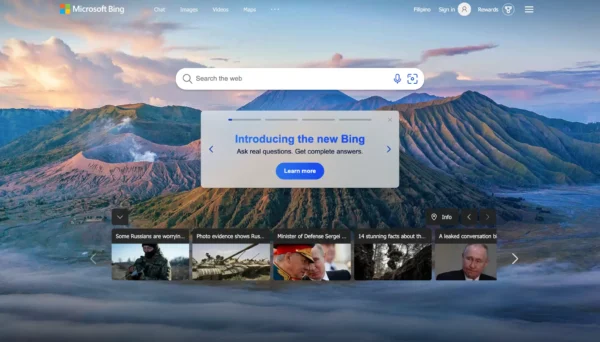
Bing, owned by Microsoft, has a background that began with the evolution of search technology. Before Bing, Microsoft had several failed attempts to create a search engine, including MSN Search, Windows Live Search, and Live Search. It was not until 2009 that Microsoft officially launched Bing, which was originally known as "Kumo."The name "Bing" was chosen to represent the sound of a discovery being made. This was a nod to the goal of providing users with a more intuitive and visually appealing search experience. Bing was designed to be a "decision engine" rather than just a search engine, to provide users with more than just a list of links. The results pages are designed to provide them with relevant information, such as maps, reviews, and even playable videos directly in the results.
What sets them apart from Google?
Ever wanted to plan that dream vacation or redecorate your pad without having to wade through long-winded instructions? Just take a picture with your phone and let Bing’s visual search do the work. While Google offers users a wider selection of images and an Advanced Search function for helpful filtering, Bing surpasses Google in providing superior quality images with more detailed information.
Bing also stands out from Google in its strategy, striving to give users more comprehensive solutions to their queries. Search Engine Land conducted an investigation and concluded that when it comes to queries like travel-related searches, Bing shines with its extensive answers.
How can you leverage this for your brand?
- Take social signals into account. Bing puts extra emphasis on social signals such as shares and likes a site receives, so those with an influential media presence should have the upper hand in Bing's listings.
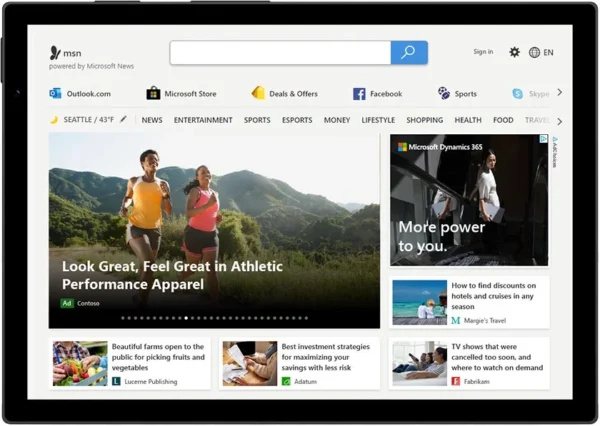
- Consider paid advertising. Bing Ads (Microsoft’s ad platform) enables companies to craft ads aimed at particular demographics, locations, devices, and more, thus, amplifying their reach. It’s an excellent way to get noticed amongst your target audience.
Yahoo
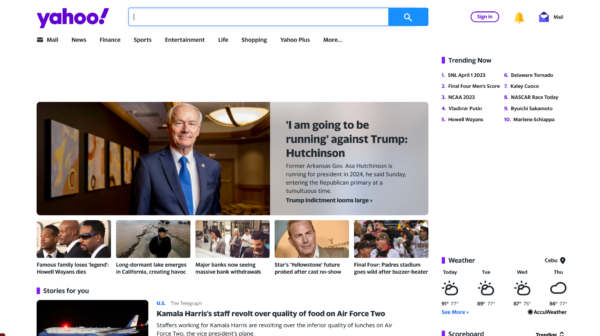
In 1994, two tech whizzes by the name of Jerry Yang and David Filo founded Yahoo, one of the web’s first search engines. It soon became a hub for finding facts, sending emails, catching up on news items, watching sports updates, and more.The 2000s were Yahoo’s glory days when it had a market value of over $125 billion and even turned down an offer from Microsoft to buy them for nearly $45 billion. But as time passed, the advent of rivals like Google and Facebook diminished their influence. Yahoo just couldn’t keep up with the advanced algorithms and social networking capabilities. Despite attempts to rebrand and pivot its focus, Yahoo ultimately failed to maintain its dominance in the tech industry.
But we shouldn't be too quick to write off Yahoo as it's still the third-biggest search engine in the U.S., even with its cubs Bing and Google following close behind. You might not get the same interactive elements as their competitors, but Yahoo can be especially handy when you need updates on news and entertainment or even finance.
What sets them apart from Google?
One of the main features that make Yahoo stand out from the rest is its focus on content. Unlike Google, which is mainly known for its search capabilities, Yahoo has emphasized producing original material across a wide range of areas. From finance and sports to entertainment and news, Yahoo has been praised for delivering quality, interesting pieces that keep users coming back for more.
How can you leverage this for your brand?
- Yahoo Small Business. This offers a range of services, including web hosting, domain registration, and ecommerce solutions. These services are designed specifically for small businesses, providing them with affordable and easy-to-use tools to help them establish an online presence. By utilizing Yahoo Small Business, you can create a professional website, register a domain name, and start selling products online.
- Yahoo Advertising. This offers various advertising options, such as display advertising, search advertising, and sponsored search. These advertising options can help businesses reach a larger audience and increase brand awareness.
Display advertising, for example, allows you to place ads on Yahoo's network of websites and partner sites. Search advertising, on the other hand, lets you present your ads alongside the results. And sponsored ads enable you to appear at the top of the results, increasing the chances of potential customers clicking through to your website.
Yummly

Yummly, the culinary innovator that transformed the way we explore food, was born from a delectable vision. In 2009, David Feller and Vadim Geshel, two passionate foodies based in Redwood City, California, decided to open up the world of cooking for everyone.
They created Yummly with the mission to bring people closer to the magic of food, providing personalized recipe recommendations based on individual taste preferences, dietary restrictions, and ingredient availability.
What started off as a platform for sharing recipes soon grew into an advanced search engine that compiles millions of recipes from recognized sources all over the web such as food blogs, online magazines, and recipe websites.
To further enhance the experience, Yummly joined forces with major food brands and stores such as Campbell's Soup, Kraft Foods, and Whole Foods enabling users to easily shop for their favorite meals and have them delivered right to their doorsteps. In 2017 Yummly was acquired by Zest Labs before Whirlpool Corporation took ownership in 2019.
Today, Yummly continues to offer its services to over 20 million registered users and to provide access to 2+ million recipes, each customized by machine learning algorithms tailored to individual flavor palettes. For home cooks and food enthusiasts alike, Yummly is the search engine for discovering delicious delights.
What sets them apart from Google?
Yummly prides itself on being a single-stop recipe-based platform for cooking enthusiasts. Its feature-rich page offers users the ability to discover, save, and plan meals effortlessly, while also utilizing its dietary filters, ensuring that individual preferences and tastes are taken into account.
What sets Yummly apart from other generic cooking websites is its personalized culinary experience. By leveraging user data across past searches, saved recipes, and purchases, Yummly's algorithm can recommend new recipes tailored to individual tastes down to the last detail.
How can you leverage this for your brand?
- Develop your own recipe. If your business offers food products, you can create and share original recipes on Yummly that incorporate your products as ingredients. By doing so, you can increase brand awareness and encourage users to purchase and try your products.
- Advertise on Yummly. You can leverage Yummly's targeted advertising options to reach specific audiences based on their dietary preferences, cooking skills, and other factors. This can help increase your brand visibility and drive traffic to your website or ecommerce platform. Moreover, you can display banner ads or custom ads on Yummly's website and app. They can be done in various formats such as display, video, and native ads.
CC Search
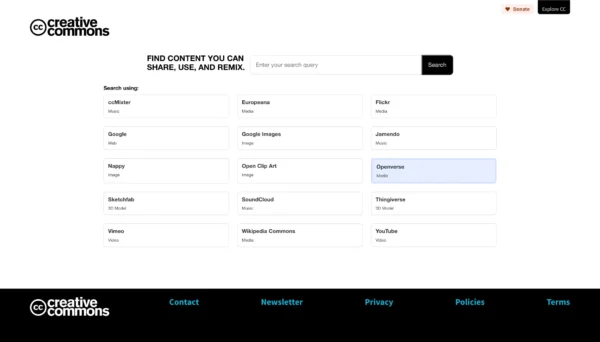
Creative Commons ventured forth into the search engine market with their new tool, CC Search. This revolutionary stool provides unrestricted access to over 2 billion creative works ranging from images and videos to a variety of other digital assets all licensed under Creative Commons licenses.
The making of art and other content available for reuse was made possible by combining it with Creative Commons' philosophy of open-source development. The goal is for users to find and utilize these proprietary works in an effortless and legal manner.
Over the years, updates have been continuously unveiled to refine the user experience as well as broaden its catalog. As a result, CC Search's ever-growing library of materials has become a reliable source for anyone looking to use Creative Commons’ resources.
What sets them apart from Google?
CC Search stands apart from Google in its specialized search options. It allows users to find content that is licensed under Creative Commons licenses, with the certainty of being able to reuse, remix, and share without copyright infringement. In comparison, a Google search may not promise the same safety, as it displays results from across the web and offers no reliable filter for appropriate usage rights.
Moreover, CC Search has more precise features. Users can select specific types of Creative Commons-licensed content such as images, videos, and music to refine their searches. Additionally, they can specify criteria such as license type, source, and much more. Thus, users can quickly locate the exact media needed for any project or purpose.
How can you leverage this for your brand?
- Find images and videos for your website and social media. With CC Search, you can explore an abundant library of media files with Creative Commons licenses. Utilize these images and videos for use on your website or social media profiles, safe in the knowledge that you won’t be crossing any copyright boundaries. Enjoy the assurance that comes from having access to assets that are legally available for reuse.
- Create marketing materials. CC Search can help you quickly find the perfect visuals for your business needs. Discover photos, videos, and other media that are ready to use in marketing materials, be it flyers, brochures, or presentations. Save time on content creation and have peace of mind knowing that all content used is legally sound.
The emergence of artificial intelligence
It is important to acknowledge that ChatGPT has become all the rage for those who want a more personalized customer service experience. Companies have been scrambling to integrate it into their chatbots to make the conversation flow more human-like. However, ChatGPT's ability to give information on more obscure topics is limited given its dependence on training data. It is quite different from your typical search engine.
Unlike search engines that crawl the internet to fetch information, ChatGPT uses sophisticated natural language processing algorithms to create responses based on what users input. But in some ways, it still works like a search engine because it can give users relevant information based on their questions or requests.
It taps into vast amounts of pre-existing data and knowledge to generate responses, similar to how search engines crawl the web to find information. The difference is that ChatGPT aims to provide more personalized and contextualized responses to users, rather than just giving a list of links or resources.
In contrast, search engines like Google use complex algorithms to evaluate web pages and determine their relevance and importance. These algorithms consider various factors such as content quality, keyword usage, and user engagement metrics to determine rankings. This enables search engines to provide users with accurate and relevant search results.
While ChatGPT relies on natural language processing algorithms to respond to user queries in a conversational manner, it may not always be able to provide the same level of precision and relevance that search engines can provide.
Therefore, it is essential to recognize that great search engines remain the backbone of information retrieval and will continue to be a valuable source for many users.
Key takeaways
While Google is great, it is worth considering alternative search engines that offer unique features and advantages to find one that better aligns with your needs and preferences. Here are some key takeaways to remember:
- Consider search engines that prioritize your privacy. Traditional search engines, like Google, often track user data and search history to better target ads and provide more personalized search results. However, some alternative search engines prioritize user privacy and take steps to ensure that user data is not tracked or shared.
- Expand your knowledge base. Some alternative search engines may be designed specifically for niche topics, such as scientific research or open-source software. Using specialized search engines can provide even more accurate and targeted information to users. By utilizing these tools, users can access a vast amount of knowledge that may not be readily available on popular search engines like Google.
- Explore different advertising options. Search engines offer different types of ad formats, including text ads, shopping ads, display ads, etc. Aside from choosing which ad format to use, you should also consider selecting the appropriate search engine that will not only suit your brand, but also your advertising goals, and target audience.
Overwhelmed with the number of things you need to incorporate SEO in your social media channels? You don’t have to carry the burden all on your own. Our team is very much willing to help! Just leave us a message on Facebook, LinkedIn, and X.
Make sure to subscribe to our newsletter and stay updated on the latest digital marketing trends and tips.
